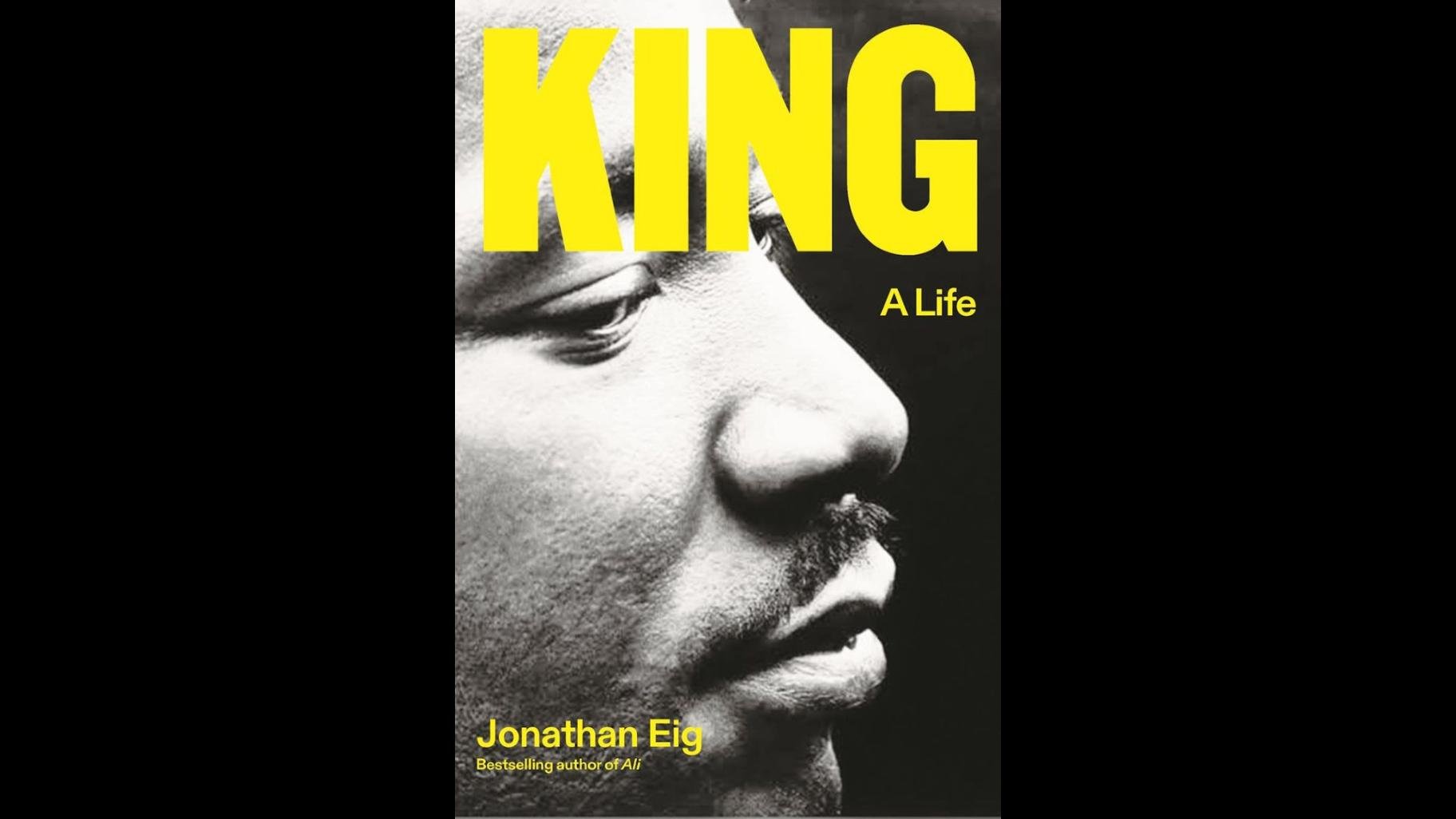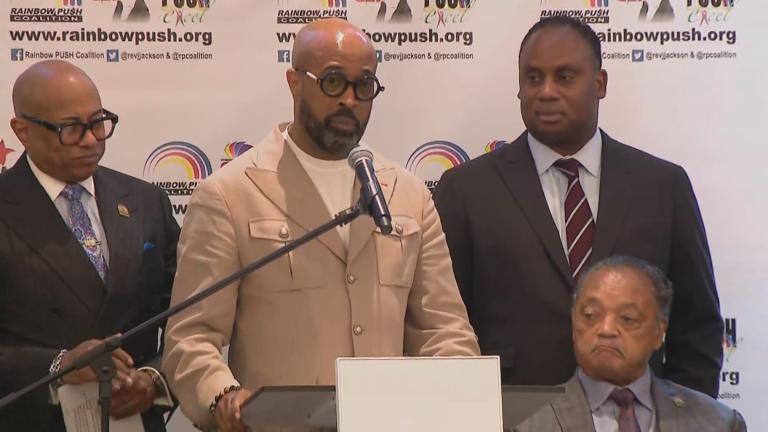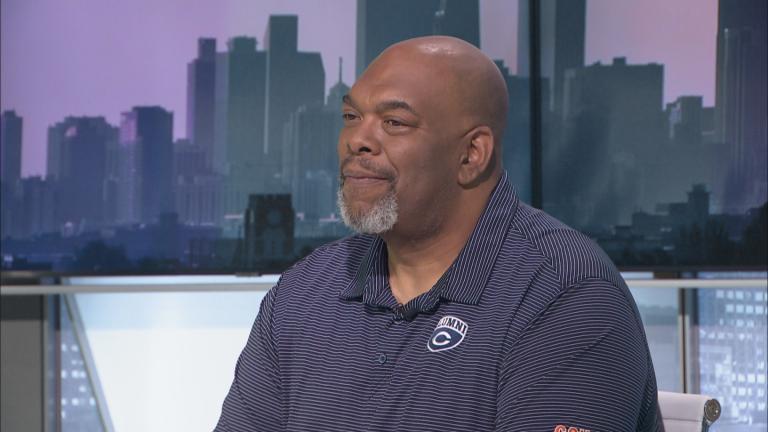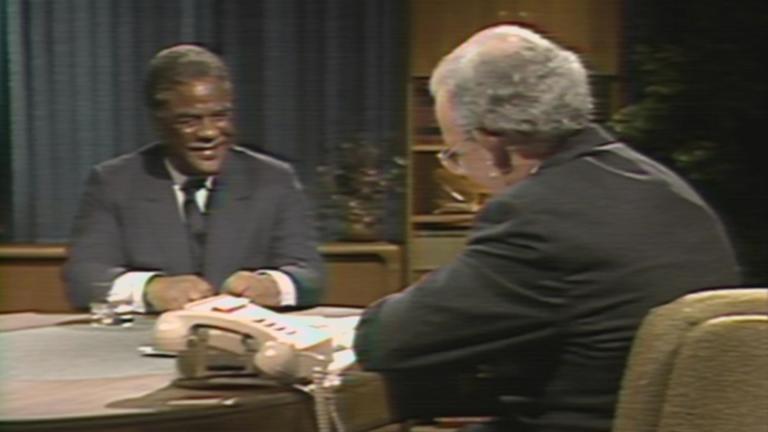“We will not be satisfied until justice rolls down like waters, and righteousness like a mighty stream.”
The Rev. Martin Luther King Jr. delivered those words during his iconic “I Have a Dream” speech at the March on Washington — which happened nearly 60 years ago, on Aug. 28, 1963.
In the 55 years since his death, King is often quoted and revered — an icon, himself.
But in the new book “King: A Life,” author Jonathan Eig draws King as “a man, not a saint, not a symbol” — delivering far more nuance than history has allowed.
Eig joined “Chicago Tonight: Black Voices” to discuss the book and King’s life and legacy.
WTTW News: No small amount of words have been written about Martin Luther King Jr., but your book is different. What were you trying to accomplish with this one?
Jonathan Eig: I wanted to write a more intimate portrait, but also one that restored his true radical nature. One of the things that’s happened in the 60 years since the March on Washington and in the 55 years since his death is that we’ve turned him into a national holiday and a monument, things that he deserves. But in the process, we’ve watered down his message and we’ve forgotten that he was human. We’ve forgotten that he struggled, that he had doubts, that he suffered, that he experienced moments of uncertainty. And I wanted to write a book that made him feel more relatable.
The book includes details from an unpublished memoir written by his father, who was hugely influential in Martin Luther King Jr.’s life. What did you learn about what kind of father he was, and how that would influence MLK as an adult?
Eig: Daddy King was a tough guy. He walked off the farm. He was born into a sharecropping family in Stockbridge, Georgia. At the age of 12 or 13, walked off the farm with his shoes tied together and slung over his shoulder so he wouldn’t wear them out, walking barefoot toward Atlanta where he basically reinvented himself. He taught himself to read. He became a pastor and took over Ebenezer Baptist Church. But he also made it possible for Martin Luther King Jr. to be who he was — literally renamed him. They were both born Michael King. Renames himself, renames his son and creates an environment where his son can actually dream of accomplishing the kinds of changes that a previous generation really could only dream about.
I learned a lot — he plagiarized a bit in his early writings, had a serious relationship with a White woman before Coretta, he was ambitious and charismatic. But he was also resistant to elevating the women of the movement, he had some extramarital affairs and maybe several, and many relationships before marriage. How did you navigate the different images of Martin Luther King Jr.?
Eig: He lived only 39 years, but in that 39 years he packed in so much. He was a very complicated man. He was somebody who really didn’t like conflict. He’s our greatest protest leader, and he doesn’t like conflict. And I think some of that comes from his relationship with his father. But you see it with Coretta, too, because Coretta was an activist before they even met. Coretta had more credentials as an activist than he did when they met.
And yet as you pointed out, he was resistant when it came to letting her get involved in the movement. He wanted her to stay home and raise the kids. So I just tried to really lean into all of that complexity and not try to simplify the man. Just let the reader decide for themselves how they feel about his weaknesses, his flaws and how that figures into his greatness because it’s all tied together.
It’s also the first biography to use these audiotapes of Coretta King — her recounting everything from their first date to preparing Dr. King’s funeral. What kind of influence was she in his life?
Eig: I love Coretta. She’s such a fascinating person. And I think that the reason King is attracted to her is because she’s so strong and she’s so outspoken when it comes to activism. When King wins the Nobel Peace Prize, Coretta says we have a greater responsibility now — not you, we — have a greater responsibility to speak out on issues beyond civil rights, to talk about human rights, to talk about income inequality and poverty, war. And it’s Coretta really sometimes leading the way. And I think that she deserves a lot more credit than she often gets.
You write about King’s time protesting slums and segregated housing in Chicago and his work with local leaders — organizing with Timuel Black, who was at first doubtful of him understanding Chicago’s complicated politics. He said at one point “This is a terrible thing. I’ve been in many demonstrations all across the South, and I can say I have never seen — even in Mississippi and Alabama — as hostile and as hate-filled as I’ve seen in Chicago.” What did King learn from his time in Chicago?
Eig: Well, he was told by many of his closest associates not to come here, that he thought they thought that he didn’t know what he was getting into and that Northern racism was more pernicious in many ways because it was better hidden than the racism that he encountered in the South.
And I think when King left here, he was deeply frustrated, but he was determined that he was not going to give up. He felt like Mayor (Richard J.) Daley was not dealing squarely with him, that Daley agreed to actually meet a number of King’s important demands. And then as soon as King left town, those demands were ignored, and that’s something we live with today. That the legacy of that failure to embrace King’s reforms haunts us to this day.
How did King’s visits to Chicago, and then staying in North Lawndale later on, reflect a shifting movement, and his place in it?
Eig: King was very successful by most measures in the South. He helped get passage of the Voting Rights and the Civil Rights Act, but he was not satisfied with that. He said that Northern segregation, Northern racism was just as bad and needed to be addressed. And when he came here, he lost a lot of his support and a lot of the White Northern liberals who sent money, sent checks to support his work, suddenly lost interest in what he was doing. And the same thing happened when he spoke out about the Vietnam War. We forget that in the last three or four years of his life, King was really fading in terms of his popularity, and people did not really believe in him. Even the March on Washington, we celebrate this weekend, 70% of Americans were against it.
What do you want people to take away from this book?
Eig: I want people to remember that King was a man that he had moments of doubt. And when you think about him that way, he becomes greater as a hero. And it also means that we can aspire to emulate him because we don’t have to be perfect to fight for what we believe in.
Read an excerpt from the book below.
 “King: A Life” by Jonathan Eig.
“King: A Life” by Jonathan Eig.
1
The Kings of Stockbridge
TAKE THIS BUCKET of milk to the neighbors, Delia King told her son Michael one day.
Delia and her husband, Jim King, lived with their growing brood of children in a tiny wooden sharecroppers’ shack in Stockbridge, Georgia, about twenty miles southeast of Atlanta. The shack and the land around it belonged to a white man. The white man kept most of the money from the crops, but it was the King family, one generation removed from slavery, that cleared the soil stone by stone, planted and picked the cotton, and went hungry when the scorching sun rendered the earth no more fertile than a rutted road. Yet when Delia heard that her neighbor had a sick cow that wouldn’t give milk, she acted without hesitation.
“She was a very devout Christian,” recalled Michael, who would go on to change his name to Martin Luther King Sr. “I remember, as a small boy, my mother was a woman who shared what she had with others,” he said in a newly discovered set of audiotaped interviews he made for an unpublished autobiography.
Michael was about twelve years old when his mother sent him on his mission that bright summer day around 1910. As he carried his bucket, he paused in front of a sawmill where he watched burly men and oxen at work, hauling timber. A voice snapped him to attention. It was the white mill owner: “Say, boy, run get a bucket of water for my men from down at the stream.”
Apologizing, Michael told the mill owner he was on an errand. He needed to go. The mill owner grabbed Michael by his shirt and kicked over his bucket of milk. As Michael bent to pick up the bucket, the white man’s boot connected with the boy’s ear. He tumbled. He tried to rise, but a fist smashed his face. Blood poured from his mouth. Everything went hazy.
Michael got up, ran home, and spotted his mother in the yard, washing clothes in an iron tub set over a fire. Delia scanned her son’s blood-crusted face and torn shirt.
“Who did this to you, Michael?” she asked, voice low and tight.
The boy didn’t answer.
“Michael!” Delia screamed. “Who did this?”
Delia marched to the mill, squeezing her son’s wrist as she tugged him along. She found the owner.
“Did you do this to my child?” She locked eyes with the man.
“Woman! You lost your mind? Get the hell outta here before I—”
Delia screamed: “Did you do this to my child?”
“Yeah…”
She lowered her shoulder and rammed the mill owner in his chest, knocking him into the side of a shed. She forced him to the ground and hammered at his face with hands and arms hardened by a lifetime of manual labor. When one of the mill workers tried to pull her away, Delia punched him, too. The others backed off.
“You can kill me! But if you put a hand on a child of mine, you’ll answer.”
Delia balled her fists, ready for more, but the mill owner wanted none of it.
Back home, Delia cleaned her son’s face. She warned him not to tell his father what had happened. A Black woman might get away with beating a white man, but a Black man would likely pay with his life.
Soon, though, Jim King heard about the mill owner’s attack on his son. As Delia had feared, Jim grabbed a rifle and went to the mill bent on revenge. The owner wasn’t there. That night, a mob of white men on horseback rode to the Kings’ shack. Jim King knew the law offered no protection, so he did the only thing he could think of to save himself and his family: he ran. He took off into the woods and stayed away through the summer and into the fall. Delia became sick. The cotton crop suffered, and the vegetables got picked too late. The family struggled to survive the winter.
Months later, Michael heard from a friend that the mill owner was no longer angry. Things could go back to normal, the friend said. Jim King came home, but normal was not an option. “I’m gonna blow one of these crackers’ heads off,” he told his son. Jim drank heavily and argued forcefully with Delia. When he left the house, he went alone, and took his rifle. He tried to shoot something his family could eat, but he was often too drunk to see a rabbit, much less hit one.
“I just wondered what was normal for us,” Michael recalled, “and how long we could expect it to last.”
* * *
Michael King’s parents were born in the so-called Reconstruction years immediately following the Civil War. Men and women recently released from slavery purchased land, started churches, and built communities. They voted, too, electing more than two thousand Black public officials, including a governor in Louisiana, ten Black members of the U.S. House of Representatives, and two U.S. senators. The historian Eric Foner described Reconstruction as “a radical experiment in interracial democracy,” during which formerly enslaved laborers became free laborers.
But the experiment failed. As W. E. B. Du Bois wrote, “The slave went free; stood a brief moment in the sun; then moved back again toward slavery.”
The white backlash to Black people’s gains was immediate—and vicious.
The U.S. government permitted white elected officials in the South to address the so-called Negro problem as they liked. Racial animosity metastasized. A system of land rental, known as sharecropping, forced Black farmers into a relationship with white landowners that was deeply exploitative. Factory owners and financiers in the North went along, for the most part, silenced by the profits generated by cheap labor. White officials in the South concluded that Black people were not only inferior, and therefore unfit to be treated as equal citizens, but also a threat to their physical safety. Southern lawmakers passed codes to establish systems of peonage not far removed from slavery. By the start of the twentieth century, every state in the South had laws designed to divide the races and subordinate Black people. The segregation rules—commonly known as Jim Crow laws—mandated separation of the races: in schools, trains, theaters, churches, hotels, hospitals, barbershops, restrooms, orphanages, prisons, funeral homes, cemeteries, and elsewhere. Jim Crow laws prohibited Black and white people from playing checkers, dominos, and card games together in their own homes. Marriage between races was forbidden, too. For many in the white community, the greatest fear of all was miscegenation, which would blur the line they had worked so hard to create and enforce. For others, the greatest fear was a reordering of power.
Supporters viewed the Jim Crow laws as a system of controls, like dams and dikes, designed to preserve the natural order as they perceived it. In 1896, the U.S. Supreme Court gave legal sanction to segregation in Plessy v. Ferguson, creating a standard of “separate but equal” that was anything but equal.
Atlanta became the unofficial capital of the booming, divided South. It was in Atlanta, in 1895, that the Black educator Booker T. Washington proposed his famous compromise, saying Black people would at least for the upcoming future accept separation of the races if the white community, in return, took responsibility for improving the skills and social conditions of Black people. But Washington’s critics feared that such a compromise would leave Black people permanently subservient. Georgia, as W. E. B. Du Bois wrote in 1903, became “the centre of the Negro problem,—the centre of those nine million men who are America’s dark heritage from slavery and the slave-trade.”
Jim King—born the year before the abolition of chattel slavery—personified the crushing frustrations of Black life in the South. He never learned to read or write. He never voted. He never owned property. Instead, he lived in a perpetual state of debt to the white men for whom he farmed. He grew lean, edgy, and angry. America hadn’t given Jim King much, and then, bit by bit, it took away what little he had managed to accumulate, leaving frustration, travail, and rage. That’s how his son Michael described it. The American dream, built on promises written into the nation’s founding documents, lost all meaning. Jim King drank until he had “a look of very quiet but very serious fire in his eyes,” wrote his son, until he no longer cared, “not about living, not about pain, not about his anger or anything else.”
Delia, ten years younger than her husband, held the family together. Born Delia Linsey in Ellenwood, Georgia, she, too, had grown up on a white-owned farm. Her father, Jim Long, had been used in slavery to sire children, to build up the owner’s supply of enslaved laborers and boost the owner’s return on investment in human property. Enslaved women were the victims of these forced sexual encounters. Delia’s mother, Jane Linsey, born in 1853, gave birth to her first child at the age of sixteen and went on to have four more, without marrying. By 1880, the federal census reported that Jane was twenty-seven, the mother of five, single, not widowed or divorced, with no occupation other than “keeping home.” Jim Long appears on the next page of the census, living nearby at the age of thirty-six, married to a woman named Francis, with ten more children.
Delia Linsey married Jim King in Henry County on August 20, 1895. On the marriage license, Delia’s maiden name was spelled Lindsey. Five years later, the Kings were living in Ellenwood, where Jim worked as a day laborer and Delia took care of their daughter Woodie and their son Michael. Another son, Lucius, died at some point during infancy. In addition to farming, Jim King worked part-time at a rock quarry until an accident in the quarry took one of his fingers and made further work there impossible. By 1910, the Kings were farming cotton in Stockbridge and raising seven children.
Federal census reports show that Delia King didn’t know how to read or write in 1900 or 1910. But by 1920, at age forty-five, she had learned, most likely by reading the Bible. When she wasn’t giving birth, feeding children, cooking for her family, sewing, washing, planting vegetables, or picking cotton, Delia cleaned and ironed clothes for white families. When it rained, the roof leaked. When ice-cold wind blew through the cracks in the flimsy walls, the family crowded around the fireplace, Michael recalled, “while our backs shivered.” They had no running water and no indoor toilet. “But Mama was at peace with herself,” Michael wrote, “because of her abiding faith.” No matter what misfortune befell her, Delia King would never “close her eyes so tight in sorrow or rage that she did not see God’s hand reaching out to her.”
Every Sunday, Delia and the children walked to church, carrying their shoes so as not to wear them out. They alternated between Methodist and Baptist churches. Jim King did not attend either one. “He didn’t care anything about church,” Michael recalled. “He wouldn’t go to church … My daddy would work all week and at the end of the week he would get drunk and then scrap with my mother … I got to where I hated Saturdays and Sundays for what my father was going to do and how he was going to act up.” But as long as Delia and the children were in church, they were safe from Jim King’s anger.
Black Baptists outnumbered white Baptists in Georgia. Black culture and Black political activism rose from the pews and pulpits of the Black church. For many, religion offered release from the pain of ordinary life. Black Baptist preachers frequently imparted the radical message that all people were free and equal under God’s laws, that the rules and regulations handed down by white men were wrong, that the racial hierarchies invented by men to justify slavery were false and craven, that the savagery of the Ku Klux Klan and the segregation laws of the South were abominations in the eyes of God, and that God would never love one group of people more than another based on the color of their skin. Prayers and hymns eased Delia King’s suffering. They offered hope that her children and grandchildren might live to see a better day. Faith in God also helped create a sense of community. Hog-killing time, for example, brought a festive sense of community and a living reminder of the spirit of Jesus’s love. As Michael King would recall years later, those who owned animals big enough to slaughter shared meat with those in need, knowing they would be repaid in kind one day. “That kind of sharing was to me Christianity in action,” he said.
Martin Luther King Jr., Delia’s grandson, would often remark on the role Christianity played in the lives of the enslaved and indentured. The land they farmed was not their own. The crops they planted and sowed were not their own. Their bodies were not entirely their own. But their souls, he said, would never belong to a plantation owner, a landlord, a hooded Klansman, a prison warden, a sheriff, a senator, or anybody else; their souls would always be free.
“So many things stood there to discourage them,” Martin Luther King Jr. said, “but the old preacher would come up with his broken language. He would look out to them and said, ‘Friends, you ain’t no nigger. You ain’t no slave, but you God’s chillun.’”
They were not educated, King said, “but they knew God.” They knew that the God they worshipped would not punish some of his children and exalt others. “And, so,” he continued, “although they knew that some days they had to go out into the field in their bare feet, that didn’t stop them. And they could sing in their broken language:
I got shoes, you got shoes,
All of God’s chillun got shoes.
When I get to heaven gonna put on my shoes
And just walk all over God’s heaven.”
* * *
Much of the King family’s history can’t be traced back before the Civil War. Owners prevented the enslaved from learning to read and write. Births and deaths often went unrecorded. Tax collectors and census takers treated Black people as property, their names not worth noting. In the first census after the Civil War, taken in 1870, Jim King appears to be recorded as a five-year-old named James Branham of Eatonton, Georgia, in Putnam County. Jim’s age and the ages of his parents—listed as Nathan and Malinda Branham—match the ages of King’s ancestors, suggesting perhaps that the family chose to drop the Branham name, which was a vestige of enslavement, and become Kings in freedom.
Tax records show that Jim and Delia King worked on a farm owned by a white man named William B. Martin, on land in Stockbridge partially occupied today by a Walmart Supercenter.
Reprinted by permission of Macmillan Publishers. Excerpted from King: A Life by Jonathan Eig. Copyright 2023 Jonathan Eig. All rights reserved.








